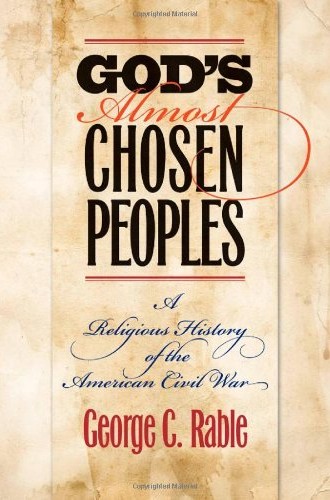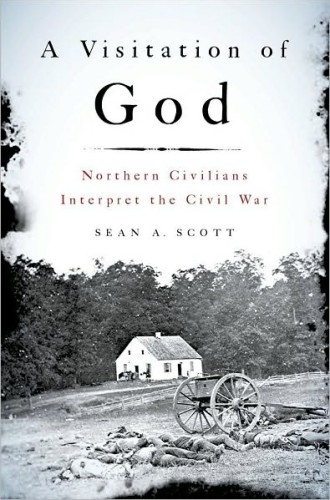Spiritualized warfare
Ambrose Bierce became a man during the Civil War. He enlisted before he was 20 and saw action from the very beginning. He fought at the battle of Shiloh in 1862 and was wounded in the head two years later. After the conflict, Bierce traded his musket for a pen and wrote some of the most biting satire of the age.
In his humorous Devil's Dictionary, in which he sought to expose selfishness and egotism, Bierce fixated on a concept that was particularly important to his era: Providence. He defined appetite, for instance, as "an instinct thoughtfully implanted by Providence as a solution to the labor problem." When it came time to define providential, Bierce explained it as "unexpectedly and conspicuously beneficial to the person so describing it."
Read our latest issue or browse back issues.
What Bierce treated with disdain was both a poignant problem and a sustaining hope for those he camped with and shot at during the Civil War. Some of Bierce's comrades may have smirked at his playfulness with Providence, but two new books reveal that Providence was the principal way most Americans made sense of the devastating whirlwinds of war. As the nation fell apart, as brother killed brother, as pastors preached politics and as politicians struggled with spirituality, they turned to God and God's activities to comprehend their worlds.
It wasn't all self-serving, though, or at least not to the degree that Bierce implied. As slaves fled for freedom, as a president was killed by an assassin's bullet and as wives buried husbands, Americans maintained the belief that God, Jesus or some instrument of heaven was in control. On their knees, in their living rooms, holding the hands of fallen comrades or writing new legislation, they could find meaning only by believing that Providence still reigned.
God's Almost Chosen Peoples is an incredibly ambitious book from one of the nation's finest historians. Known for his previous works in Civil War military, social and political history, George Rable brings decades of professional expertise to bear on the faith of the era. His 400 pages of text and 200 pages of notes attest to his expansive view of the war. He pays attention to almost everyone: chaplains preaching to card-playing soldiers in Virginia; Mormon leaders hoping the war will vindicate their assassinated prophet; Lincoln ruminating on slavery, union and liberty; and Catholics debating and dividing over spiritual and temporal allegiances. Rable moves from north to south, from east to west and from campfires to convention halls with skill and dexterity.
He argues that the vast majority of Americans—black and white, male and female, Protestant, Catholic, Mormon and Jewish—interpreted the war providentially. They looked for God's designs behind political, social, military and personal events. In victory, they praised God for his goodness. In defeat, they felt assured that the Lord was chastening them for some sin, such as alcoholism or gambling. A loved one lost was remembered for patriotism, and the bereaved took solace in thoughts of heavenly reunion. Freedom for slaves meant vindication of the hope in Exodus, and Confederate failure was transformed into a divine lesson in humility.
Americans went into the war believing that God was on their side, and they ended the war believing the same—even if their goals, hopes, dreams and outcomes differed radically. The irony of it all, Rable acknowledges, was lost on just about everyone except Lincoln.
In A Visitation of God, Sean A. Scott develops a similar storyline, but with far more limited goals. Scott focuses on evangelical Protestants in the northern Midwest—Michigan, Ohio, Illinois, Indiana, Wisconsin and Minnesota. Through extensive and close readings of personal letters and local newspapers, Scott shows how the war enveloped the spiritual lives of civilians—how it affected their personal faith, church identity, family life and devotional piety.
Where Rable sees irony, Scott finds catastrophe. Writing from the belief that "the church" is "an apolitical institution, established for the purpose of preparing believers for the world to come," Scott despises the politicization of religion during the war. Following the lead of Harry Stout's Upon the Altar of the Nation, he describes how political and social issues dominated northern religious life. Rather than preaching Christ and him crucified, ministers turned to sermons about abolition, the Union and war. Patriotism, emancipation and loyalty became the focus of faith, rather than depravity, atonement and salvation. The politicization of the church led to bickering, division and frustration. The church suffered, Scott concludes, because it "gave its soul to the nation."
Deeply researched and written with subtlety and skill, both books reveal the vitality of faith during this most harrowing of times. Rable's book will become a classic for its breadth and its depth. Scott's will inspire other scholars to take seriously the experiences and thoughts of everyday Americans.
But for all they offer, both volumes suffer in one area: race. They agree with Lincoln that somehow the war was about slavery. But neither places slavery or slaves at the center of the narrative. They extend Stout's brilliant analysis of the morality of the war but fail to grapple thoroughly with the moral problems of slavery, freedom and white supremacy. Rable completes several hundred pages before he addresses black faith, and when he does it is with far less nuance, complexity and interest than when he discusses the souls of white folks. Scott centers on the Midwest because it was a region of "plain people." He never mentions that it was also a place almost uniformly of white people. Indiana in 1860, for instance, had 1.3 million residents; only 11,000, or less than 1 percent, were black.
If Scott had approached race more critically, his lamenting of the politicization of the church might have taken a different shape. What scholar, minister or theologian would feel comfortable regarding the church as an apolitical institution while studying the civil rights movement? Didn't Martin Luther King Jr. and his allies try to convince white Americans that their activities and complicities in racist political and social arrangements had moral, ethical, spiritual and religious ramifications—not just for people of color, but for whites as well?
Many northern Christians supported the Union and were willing to sacrifice any amount of blood to save it. But slaves knew that more was at stake. They knew that slavery was an institution built on violence; they knew that their moral and family choices were constrained and that their ability to worship where and how they wanted was limited. And as Frederick Douglass made clear, whites' faith was conditioned and compromised by slavery as well. One hopes that the next generation of studies on religion and the Civil War will take more seriously the place of race and incorporate it into moral understandings of experiences during the war.







